Artificial Intelligence (AI) is rapidly transforming industries, redefining career paths, and creating unprecedented opportunities for future professionals.
According to Statista, AI refers to the ability of a computer or machine to mimic the competencies of the human mind. The AI technology market is valued at approximately USD 244 billion in 2025 and expected to exceed USD 800 billion by 2030.

This impressive growth signals a future where AI is not just a technological trend but a fundamental component of nearly every profession. To succeed in AI-integrated careers, students will need technical skills, adaptability, critical thinking, and the ability to collaborate with intelligent systems.
In this guide, we will provide students with a roadmap to navigate this AI-driven world. It will explore the skills required to thrive, emphasizing how to leverage AI as a collaborator rather than viewing it as a competitor.
What AI-Integrated Jobs Actually Look Like
Forget the Hollywood idea of robots taking over. Real AI integration enhances human work rather than replacing it. According to McKinsey & Company, much of generative AI’s near-term value comes from helping people do their current jobs better.
These AI “copilots” assist by drafting code for developers, generating requisition orders for maintenance workers, or analyzing data for faster decision-making. In industrial settings, for example, AI copilots can identify equipment issues early, pinpoint root causes of breakdowns, and provide best-practice guidance.
In practical terms, AI-integrated roles blend human expertise with AI capabilities. Marketing professionals may analyze customer data with AI while designing creative campaigns. Financial advisors can process market trends while building client relationships, and healthcare workers can leverage AI diagnostics while providing empathetic patient care.
The key is pairing AI’s efficiency with distinctly human skills of creativity and strategic thinking to unlock the most meaningful opportunities.
It can be difficult to visualize how these changes impact your daily workflow. The comparison below illustrates the fundamental shift from traditional calculation-heavy roles to the new strategic verification model.
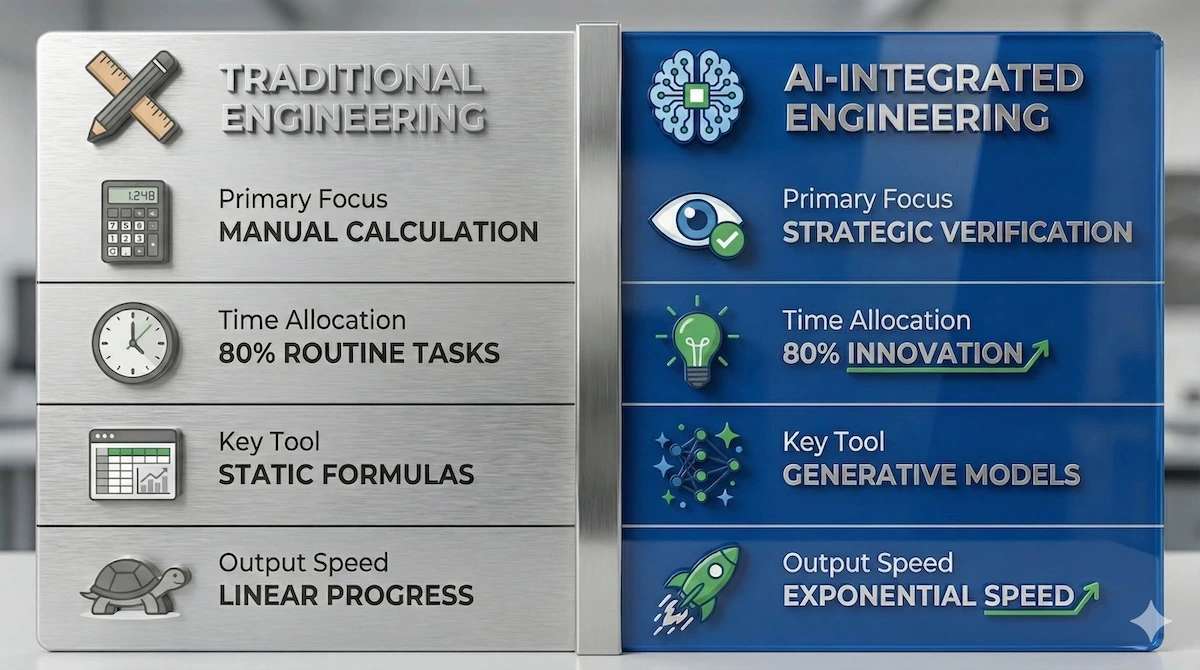
This comparison highlights how AI shifts your role from manual computation to high-level strategic verification.
As you can see, the focus isn’t on working harder at the math, but on becoming the strategic architect who verifies the results.
Build Your AI-Ready Skill Set in College
Your college years are the perfect time to start building expertise in AI collaboration. Look for courses that combine your major with data analysis, statistics, or introductory AI concepts. A psychology major might take courses in computational social science. A business student could explore AI applications in marketing or operations. An art student might experiment with AI-assisted design tools.
Seek out hands-on projects that let you work with real AI tools. Many universities now offer access to AI platforms and software that would have cost thousands of dollars just a few years ago. Use these resources to understand how AI can enhance work in your field. Create projects that showcase your ability to combine AI capabilities with human insight and creativity.
Don’t limit yourself to formal coursework. Online platforms offer countless opportunities to experiment with AI tools relevant to your career interests. The key is moving beyond passive learning to active experimentation. Build a portfolio that demonstrates not just what you know about AI, but how you can use it to create value.
If you struggle with the concepts of AI, hire AI tutor to save time and speed up your learning. My Engineering Buddy has several tutors who can help you with AI and related subjects and courses online.
Careers Focused on AI Development
For students passionate about technology, careers in AI development provide some of the most exciting and impactful opportunities today. These roles place you at the forefront of creating intelligent systems that drive healthcare breakthroughs, climate solutions, and educational innovation.
Paths include machine learning engineering, AI research, and product management for AI-powered applications. You might design natural language processing tools, build computer vision for medical diagnostics, or develop recommendation algorithms used globally.
Additionally, the ethics of AI is becoming an important field to pursue. Software engineers play a vital role in shaping how AI systems function and interact with the world.
According to Baylor University, its coding and algorithmic decisions ensure that AI operates responsibly. Internships, research projects, and competitions help students build and showcase their ethical, practical, and technical expertise in AI.
Practical Steps You Can Take Right Now
Start building your AI-integrated career foundation today. Create accounts on platforms and experiment with tools relevant to your field. For marketing students, this could mean trying AI writing assistants; for pre-med students, it might involve exploring AI diagnostic platforms.
Document your learning journey on a personal website or blog. Employers want to see that you can think critically about AI’s applications and limitations, not just that you can use the tools. Share projects that demonstrate your ability to combine AI with human insight to solve real problems.
Integrating these skills takes time. Here is a year-by-year roadmap to guide your progression through university.
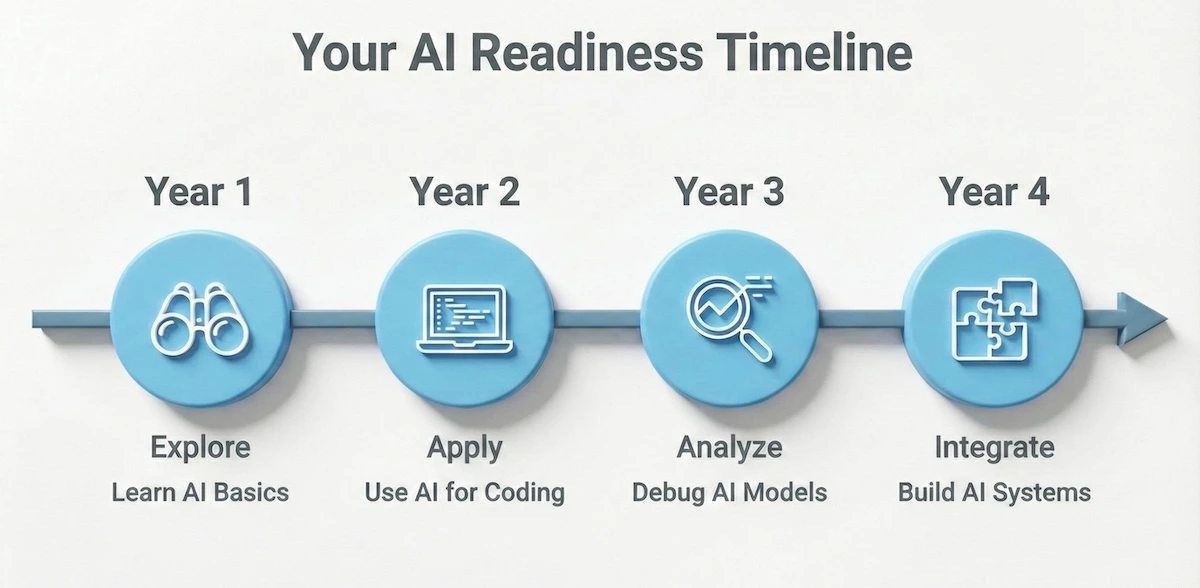
Follow this year-by-year roadmap to gradually build the AI competencies employers are looking for.
By following this timeline, you ensure that you graduate not just with a degree, but with a career-ready skillset.
Based on a survey from PwC, almost 50% of technology leaders report that AI is completely integrated into their company’s main business strategy. This shows that AI isn’t just a niche tool. It’s becoming a foundational part of business operations.
Network with professionals in AI-integrated roles and consider internships at companies actively implementing AI. Even if your role isn’t AI-focused, being part of an organization navigating this integration will provide valuable insights into future career opportunities.
Skills That Will Set You Apart
To thrive in AI-integrated careers, students must develop a specific combination of technical and human skills. Start with AI literacy, understanding what AI can and cannot do and how to evaluate its outputs critically. Learn to ask questions like: Is this AI recommendation biased?
Beyond technical knowledge, analytical thinking is essential. You’ll constantly be interpreting AI-generated insights, requiring strong critical thinking and the capacity to synthesize information from various sources.
Most importantly, double down on uniquely human skills. As stated by USA Today, while hard skills like data analysis are a baseline, soft skills like empathy and communication are irreplaceable. For instance, the most appreciated doctors have excellent bedside manners.
Similarly, employees who build genuine connections and use emotional intelligence will be indispensable in an AI-driven world, where relationships are key to collaboration and problem-solving. These human-centric abilities are what will truly set you apart.
To thrive in this new landscape, you need to operate at the intersection of three critical domains. We call this the ‘AI-Ready Sweet Spot’.
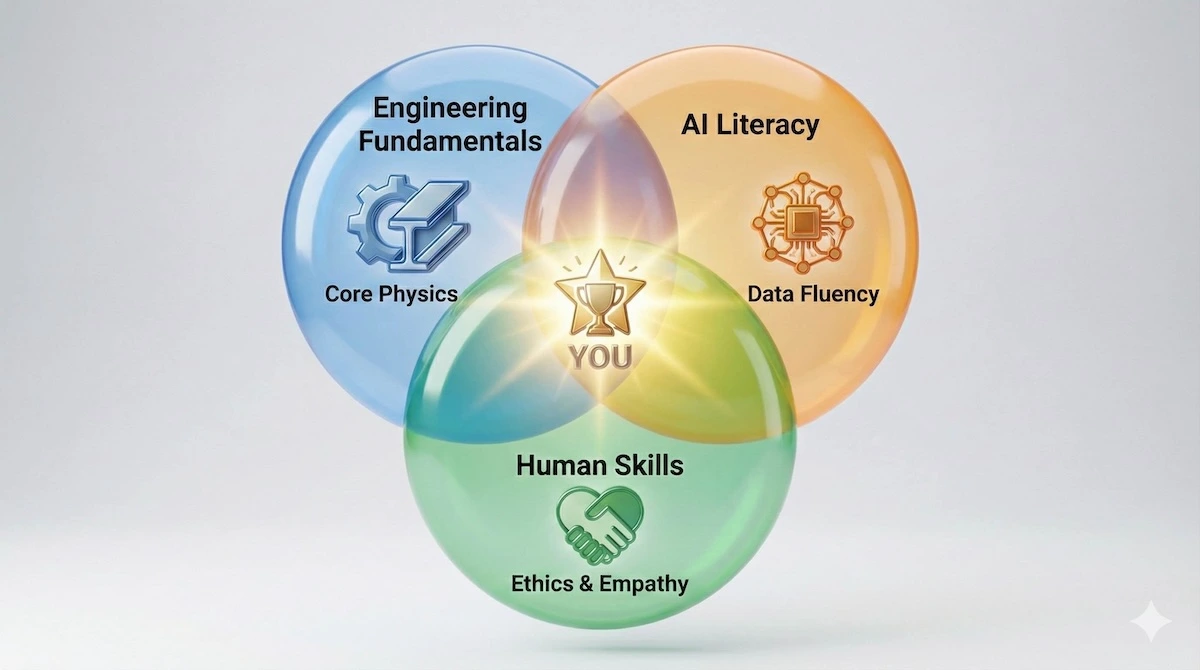
Success in the AI era requires finding the balance between technical knowledge, data fluency, and uniquely human skills.
The engineers who command the highest value will be those who can stand firmly in the center, bridging the gap between raw data and human empathy.
Frequently Asked Questions
How can students use AI to their advantage?
Students can use AI to their advantage by experimenting with AI tools for research, writing, and data analysis, while critically evaluating outputs. They can build portfolios showcasing projects and gain hands-on experience through internships. At the same time, developing human skills, creativity, empathy, and ethical judgment helps them stand out.
What jobs are not affected by AI?
Jobs that rely heavily on human creativity, empathy, and complex judgment are less affected by AI. Roles such as therapists, teachers, caregivers, artists, and leaders in strategic decision-making remain uniquely human. These professions depend on emotional intelligence, ethical reasoning, and personal connection, qualities AI cannot replicate.
Not all tasks are created equal when it comes to automation risk. The data below highlights which parts of your future job are likely to be automated versus which are safe.
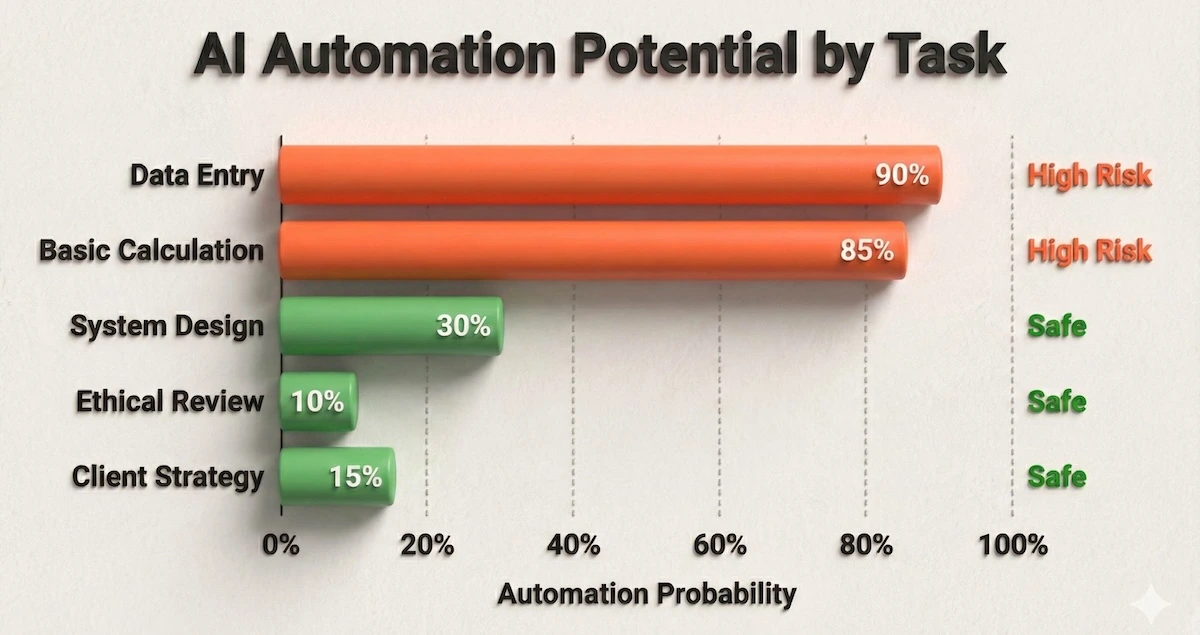

By focusing your elective courses on ‘Safe’ areas like system design and ethics, you effectively future-proof your career.
How can I prepare for AI job changes?
You can prepare for AI-driven job changes by building AI literacy, learning to use relevant tools, and strengthening technical skills. Equally, focus on soft skills like communication, creativity, and emotional intelligence. Gaining experience through projects, internships, and networking will position you to adapt and thrive.
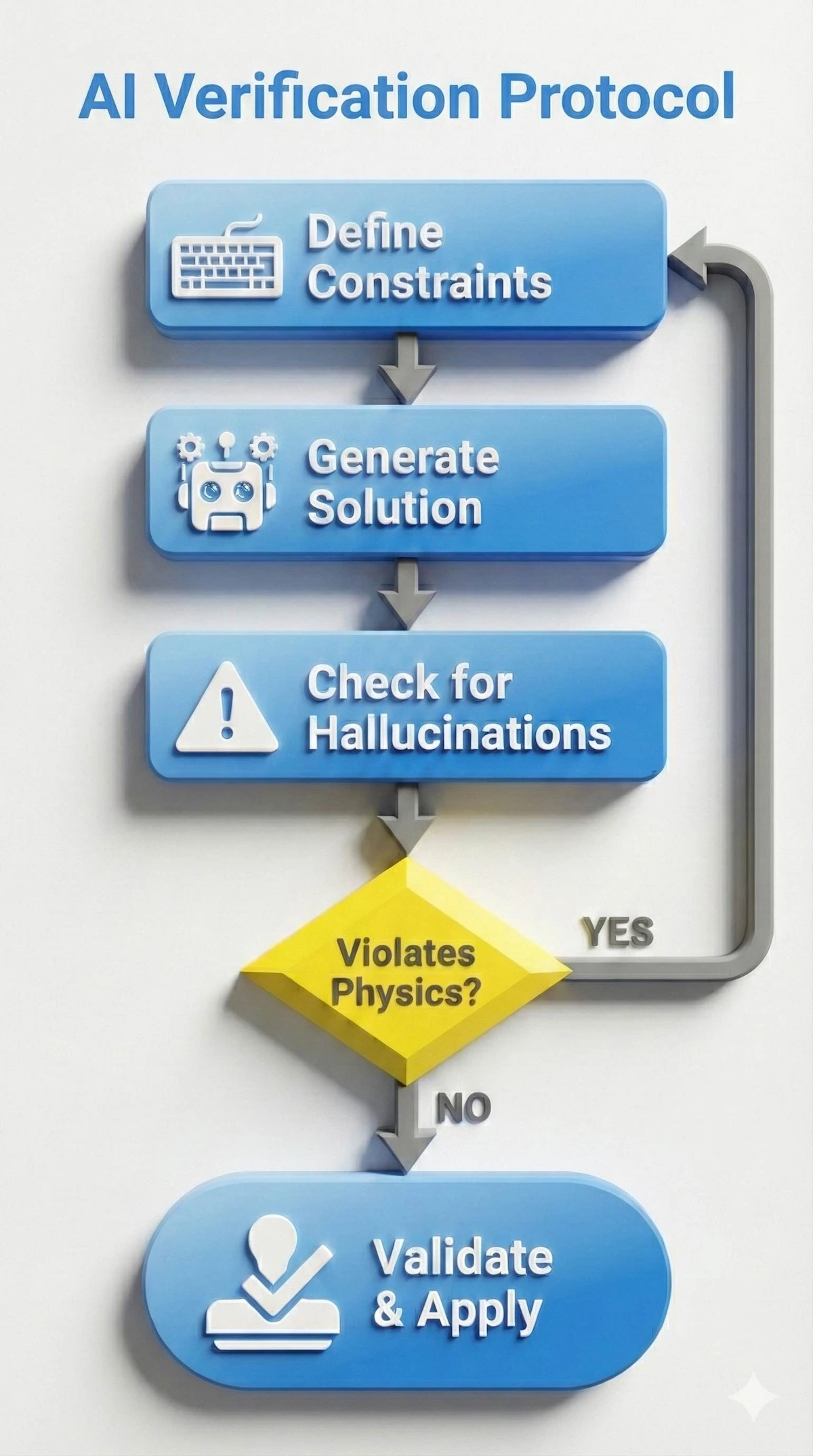
Your career in an AI-integrated world will be about partnering with intelligent systems to achieve what neither humans nor AI could accomplish alone. The students who thrive will be those who embrace AI as a powerful collaborator while strengthening the uniquely human skills that set them apart.
The opportunities ahead are unprecedented. You have the chance to shape the future of work and to solve challenges that previous generations could only imagine.
******************************
This article provides general educational guidance only. It is NOT official exam policy, professional academic advice, or guaranteed results. Always verify information with your school, official exam boards (College Board, Cambridge, IB), or qualified professionals before making decisions. Read Full Policies & Disclaimer , Contact Us To Report An Error
